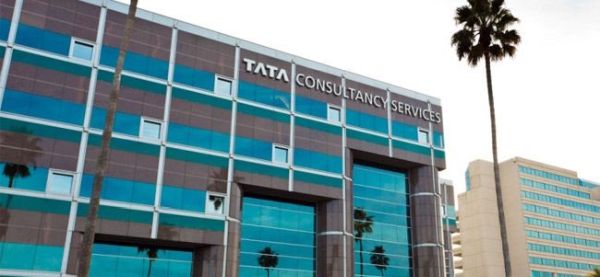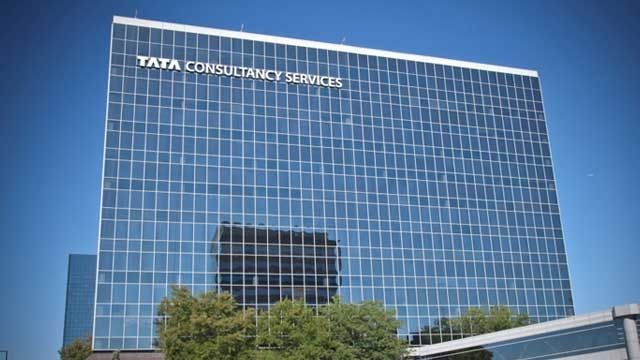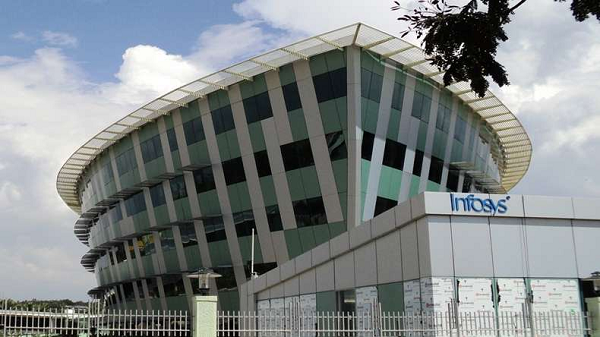
by admin | May 25, 2021 | Business, Economy, Markets, Medium Enterprise, News
 Mumbai : Global software major Tata Consultancy Services (TCS) on Tuesday reported Rs 7,340 crore consolidated net profit for the first quarter of fiscal 2018-19, registering 23.5 per cent annual and 6.3 per cent sequential growth.
Mumbai : Global software major Tata Consultancy Services (TCS) on Tuesday reported Rs 7,340 crore consolidated net profit for the first quarter of fiscal 2018-19, registering 23.5 per cent annual and 6.3 per cent sequential growth.
In a regulatory filing on the BSE, the city-based IT firm said consolidated revenue for the quarter (Q1) under review grew 15.8 per cent annually and 6.8 per cent quarterly to Rs 34,261 crore.
Under the International Financial Reporting Standard, net income grew 17.2 per cent year-on-year to $1.1 billion and revenue 10 per cent to $5.1 billion for the first quarter.
“Revenue from North America market grew highest in the last 12 quarters or three years by 7 per cent annually and 3.7 per cent quarterly on recover from banking, financial services and insurance (BFSI) and retail,” said TCS in a statement here.
Operating margin remained flat at 25 per cent as in the previous quarter (25.4 per cent).
“Digital business contributed 25 per cent to the overall revenue and grew a whopping 44.8 per cent YoY,” it added.
The company added 2 new clients in $100 million billing rate and 13 clients in $5 million band sequentially.
“We have started the new fiscal year on a strong note, with the growth engine firing on all cylinders. We had good wins, a robust pipeline and accelerating digital demand,” said TCS Chief Executive Rajesh Gopinathan in the statement.
Noting that customers across verticals and markets were embracing the company’s Business 4.0 thought-leadership framework, he said contextual knowledge, full spectrum capabilities and investments in research and innovation were making TCS their preferred partner for growth and transformation initiatives.
TCS Chief Operating Officer N. Ganapathy Subramaniam said the year’s first quarter was excellent due to growth across segments and client additions.
“We are seeing strong demand in cloud transformation, cyber-security, data privacy and automation. Our investments in Machine First Delivery Model and Location-independent Agile are giving customers business benefits and speed to market,” he said.
TCS Chief Financial Officer V. Ramakrishnan said disciplined execution, accelerating growth and currency support helped the company mitigate the impact of wage increases during the quarter.
“A strong quarterly start gives us confidence in our ability to get our operating margin to our preferred range, while continuing to fund the digital investments,” he said.
The company applied for 3,978 patents, including 62 during the quarter, and was granted 715.
Its headcount crossed the 4 lakh mark and touched 400,875 on consolidated basis. Women accounted for 35.6 per cent.
The IT services attrition rate fell 0.1 per cent to 10.9 per cent, while the total attrition rate, including business processing services fell to 11.7 per cent.
“We continue to invest in upgrading the skills of our employees while leveraging their contextual knowledge and domain experience,” said Human Resources global head Ajoy Mukherjee.
The twin strategy has resulted in a dynamic work place and a strong digital solutioning capability to deliver differentiated outcomes for its global customers.
The company’s blue-scrip of Rupee 1 face value ended at Rs 1,877 per share at the end of Tuesday’s trading on the BSE, losing Rs 10.65 from Monday’s closing price of Rs 1,887.65 and opening at Rs 1,895.20.
The scrip also touched a high of Rs 1,900 and a low of Rs 1,872 during the intra-day trading session on the bourses.
—IANS

by admin | May 25, 2021 | Business, Corporate, Corporate finance, Investing, Large Enterprise
 New Delhi : In its biggest deal to date, Tata Consultancy Services Ltd (TCS) on Friday signed a multi-year agreement worth more than $2 billion with the US-based insurance company Transamerica to digitally transform its life and annuities business.
New Delhi : In its biggest deal to date, Tata Consultancy Services Ltd (TCS) on Friday signed a multi-year agreement worth more than $2 billion with the US-based insurance company Transamerica to digitally transform its life and annuities business.
The partnership enables Transamerica — a leading provider of life insurance, retirement and investment solutions — to enhance its digital capabilities, simplify the service of more than 10 million policies into a single integrated modern platform and drive greater sustainable growth opportunities through better customer experiences.
“The multi-year agreement is worth more than $2 billion in revenues, the largest contract signed by TCS to date,” the company said in a statement.
The agreement is expected to lead to annual run-rate savings of approximately $70 million initially — growing to $100 million over time — for Transamerica.
“TCS is helping to guide many of today’s leading companies through their business 4.0 journeys, in building their digital spines, becoming more agile, creating superior customer experiences, and driving exponential growth,” said Rajesh Gopinathan, CEO and Managing Director of TCS.
“We have invested heavily in our insurance digital platform, TCS BaNCS, and our extensive US capabilities, and are proud to partner with Transamerica in its ongoing transformation and welcome the transitioning employees to promising new careers at TCS,” Gopinathan added.
The partnership will also support Transamerica’s overall transition to a simplified, cloud-enabled platform for agile new product development, enhanced services, acquisitions and strategic innovation investments.
“TCS was carefully selected because of their significant, ongoing investments in technology and their expertise in the insurance and annuity industry,” said Mark Mullin, Transamerica President and Chief Executive Officer.
“TCS will provide valuable administration and quality customer service, and Transamerica will continue to engage with our customers, clients and advisors in the most meaningful ways to them by utilising our digital engagement platforms and developing new solutions that help people save, protect, invest and retire,” Mullin added.
In the European market, “TCS BaNCS” has become a successful digital platform for more than a decade, with more than 17 million policies under administration.
For the US market, TCS has adapted the platform to meet its operational and regulatory needs.
“TCS continuously invests in the latest technologies, local talent and US facilities to help leading US companies adapt to rapidly evolving customer demands. This agreement with Transamerica marks TCS’ entry into a highly specialised US Insurance Third Party Administration marketplace,” said Suresh Muthuswami, President and Global Head, Banking, Financial Services and Insurance Platforms, at TCS.
TCS will also make job offers to the applicable Transamerica employees. Employees transitioning to TCS will be given the opportunity to remain in the same US cities where they are currently based.
Beyond offering roles to 2,200 Transamerica employees across US cities, TCS also plans to hire locally in Iowa, set up relationships with educational institutions and help employees with professional development to gain digital skills and fluency, the company added.
—IANS

by admin | May 25, 2021 | Opinions
 By Amit Kapoor,
By Amit Kapoor,
Infosys is yet again in the news for all the wrong reasons. The poster child of the Indian IT industry just cannot seem to stabilise its ship even after a decade of consistently losing market share under different leaders, mostly comprising of its co-founders. In fact, Vishal Sikka was the first non-founder CEO for the company and was the first one successful in bringing stability to the companys market performance vis-à-vis rivals like Tata Consultancy Services (TCS) since it had begun deteriorating almost a decade ago.
The real story in the Infosys saga, however, does not lie in the intricacies of the company’s boardroom battles but the larger malaise that it highlights within the Indian corporates as a whole.
First, the succession planning of Indian corporates seems to be a serious issue. While the concept of succession planning exists in India, bluechip corporates have been struggling to successfully put it into practice. Sikka’s abrupt exit puts the company in a state of disarray. The Indian system of succession planning within corporates differs largely from their global counterparts, which begin to hunt for a successor quite a few months in advance.
Second, there seems to a lack of clarity on the role that different stakeholders play in a company. Promoters in companies need to define their roles as executives, board members and shareholders. Problems like the one in Infosys arise when promoters overstep their roles and assume different responsibilities at different points of time. The founders at Infosys seem to be having a tough time letting go of their control over the company and often cross jurisdiction is the result. After N.R. Narayana Murthy stepped down as CEO in 2002, three co-founders succeeded him — mostly unsuccessfully in maintaining the company’s growth trajectory. Murthy’s vocal interference in the company’s workings and Nandan Nilekani’s return following Sikka’s exit points to an utter unwillingness of handing over control to an “outsider”. Founders assuming control anytime they feel uncomfortable with operations undermines decisive leadership and puts the stability of the company under threat.
Third, corporate governance seems to be quite problematic among Indian firms. The fact that the issue has arisen in a firm that made the concept popular in India is especially concerning. When the acquisition of Israeli solutions provider Panaya was questioned by Murthy, a shareholder in the company, it behoved the board to address the concerns to the satisfaction of its shareholders. Transparency is the key to ensuring the highest standards of corporate governance. In the board’s defence, they did call for an independent inquiry into the matter and found no wrongdoing. However, it fell short of releasing the complete reports of the investigation as demanded by Murthy.
All these factors — succession planning, clarity of roles and corporate governance — play a crucial role in determining the sustainability of large firms and if they become a ubiquitous problem, among Indian corporates, their survival might come under threat. There is also a much larger problem that springs out of the tendency of the old guard to not let go of their companies – the ability to innovate.
Infosys was slowly becoming irrelevant with back office processing and IT support work due to large scale automation. Rapid automation calls for a move into emerging sectors like Artificial Intelligence (AI) and robotics for IT firms and Infosys was losing ground here. Sikka attempted venturing into these disruptive sectors and the founders who were accustomed to making profits through labour arbitrage did not feel comfortable with such moves.
This is a typical problem with large firms. Innovation does not come easy to them. In most industries, innovators are usually “outsiders” in some sense. Either it comes from a new company whose founder has a non-traditional background or from existing companies through senior managers who are new and unfamiliar to the industry. Such sets of people are usually more able to identify new opportunities and are bolder in pursuing them as well. This is the biggest problem with Infosys and results in slow-paced innovation within the company, which is hurting the company itself in the long run. An innovation handicap will mark the company for its slow demise in an industry as fast paced as IT. On a larger scale, it also damages the country’s ability to innovate as a whole, which is quite worrying for its relevance on the world stage.
Therefore, the crisis in Infosys isn’t just limited to the company itself. The Indian corporate sector needs to take copious notes as it unfolds and learns what not to do in order to ensure its sustainability. Also, it must learn not to fall into the trap of sticking to old ideas at the cost of innovation.
(Amit Kapoor is chair, Institute for Competitiveness, India. The views expressed are personal. He can be contacted at amit.kapoor@competitiveness.in and tweets @kautiliya. Chirag Yadav, senior researcher, Institute for Competitiveness, India has contributed to the article)
—IANS

 Mumbai : Global software major Tata Consultancy Services (TCS) on Tuesday reported Rs 7,340 crore consolidated net profit for the first quarter of fiscal 2018-19, registering 23.5 per cent annual and 6.3 per cent sequential growth.
Mumbai : Global software major Tata Consultancy Services (TCS) on Tuesday reported Rs 7,340 crore consolidated net profit for the first quarter of fiscal 2018-19, registering 23.5 per cent annual and 6.3 per cent sequential growth.

